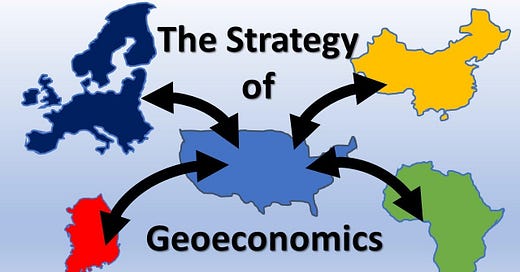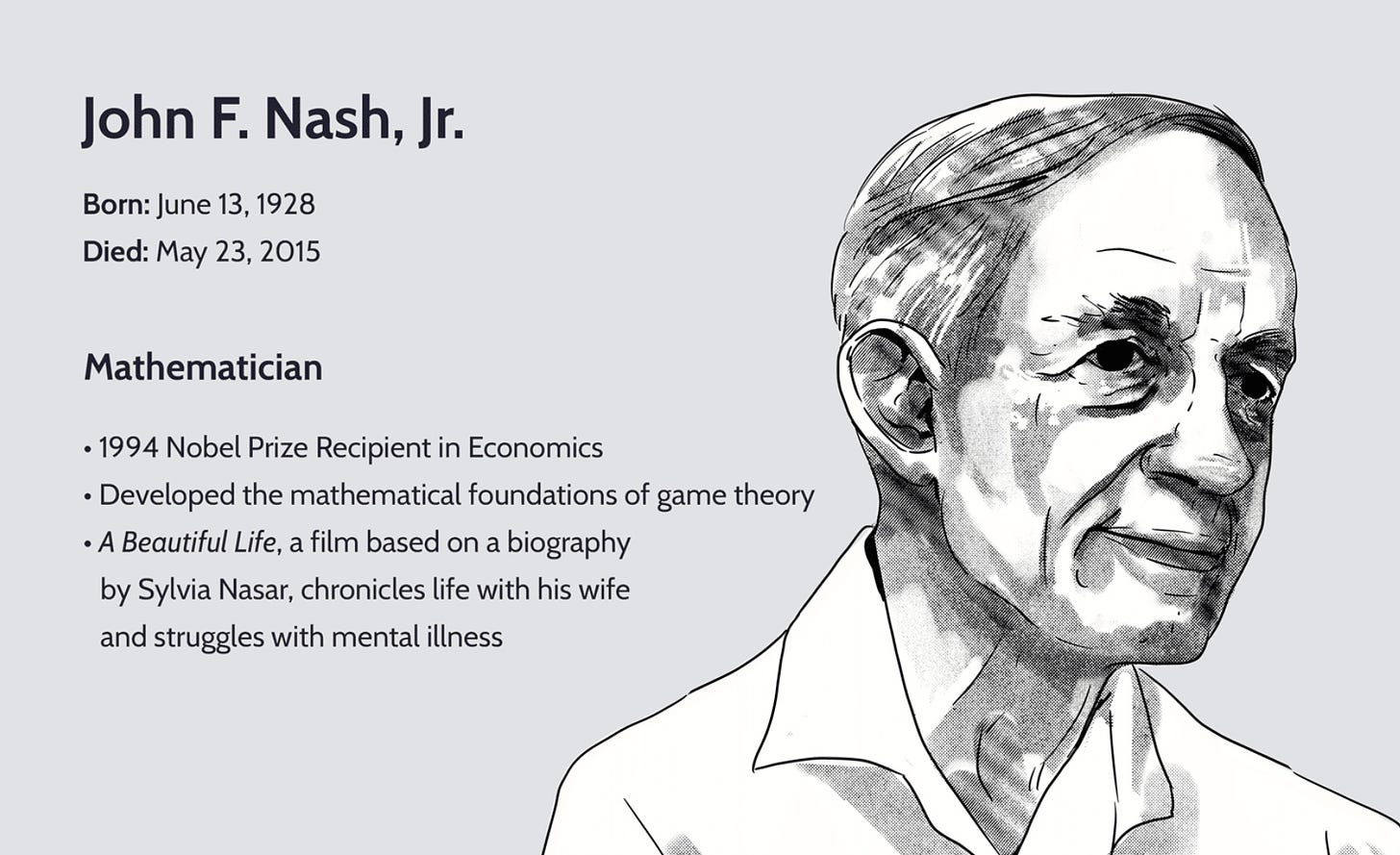Are you listening and watching what’s happening around the world? Macroeconomics and Geopolitics create the fundamental influences that most look for. There’s another element, a critical integration of these two that “rule my world”, Geoeconomics.
In my upcoming courses I begin with “emotional elements” that influence all of our basic investing and trading tendencies. That’s a great place for everyone to start. For me, I then shift to what I consider to be the most “fundamentally” important element that effects the world, Geoeconomics.
If you have been following me here on Substack or directly on LinkedIn you will have discovered that how the “world” turns has a major effect on my “long-term” investing and trading. I’m a hedger, a boring person at heart for good reason. While the “world” is changing, quite often the effects and the outcomes remain the same. We are victims of a “herd” mentality and my entry and exit points, using “technical” analysis reflects that. All told, it is not the easiest task to teach but The Ticker is developing a way to do just that. Everything that’s good takes time and this venture is no different.
So let’s give you a few tidbits about what the courses are going to “drill” into that void “between your ears”. I like “voids” much better than utilizing a “replacement therapy” where most of what you’ve learned the “wrong” way needs to first be erased. Face it folks, learning is a marathon, not a sprint so let’s get a head start on Geoeconomics.
What Are The Components of Geoeconomics?
Geoeconomics refers to the use of economic instruments and strategies as tools to achieve geopolitical objectives and enhance a country's influence globally. It involves the deliberate integration of economic policies, instruments and natural resources into a nation's overall geopolitical strategy. Geoeconomics transcends traditional economic considerations incorporating powerful strategic elements of influence and competition into the international arena. Geoeconomics uses trade policies, investment strategies and financial measures to advance basic national interests and to achieve geopolitical goals. It emphasizes “interconnectedness” of economic and political forces and recognizes that all economic actions can have profound geopolitical implications and vice versa.
Geoeconomics will recognize that economic strength is a very crucial component of national power and states engage in strategic competition to secure economic advantages and influence. While macroeconomics emphasizes overall efficiency, resource allocation and market dynamics, geoeconomics introduces a strategic dimension. Economic decisions in geoeconomics are made with the basic intent of achieving geopolitical goals. Geoeconomics places a much higher emphasis on advancing a country's national interests and security concerns, going beyond the traditional economic focus on maximizing utility and welfare.
Traditional geopolitics focuses on national military power and related influence. Geoeconomics leverages economic basics. While geopolitics and geoeconomics share the goal of advancing national interests, geoeconomics always integrates economic and political strategies more comprehensively as components of this overall power.
In summary, geoeconomics represents a basic strategic approach to economic statecraft, whereas macroeconomic instruments will be consciously employed to enhance a nation's geopolitical standing. It stands on its own apart from traditional economics and geopolitics by integrating in economic and political strategies in the pursuit of national interests on the global stage.
There you go, an introduction. Like everyone else, you’re going to learn a lot more in the actual classes but as we all know, you have to start somewhere. Let’s now turn our attention to John F. Nash, Jr. and the role Russell Crowe played in “A Beautiful Mind”. It was a tremendous film and one everyone should watch. I had the pleasure to meet John in the early 1980s and to say the least, it was obvious that he thought in ways all of us would simply be envious of.
What Are the Effects of Game Theory in Modern Geoeconomics?
Game theory is a mathematical way to analyze strategic interactions among overall rational decision-makers. It explores how individuals or entities make all choices to achieve objectives while considering the responses of others. “Nash Equilibrium” will occur when each participant's strategy is optimal given the strategies chosen by others. It’s a stable state where no player has an incentive to unilaterally deviate from their chosen strategy. In geoeconomics, nations engage in strategic decision-making to pursue economic and geopolitical goals. The decisions of one nation influence the choices and responses of others. Objectively they seek balance.
Nations engage in trade wars, imposing tariffs on each other's goods and services. An equilibrium may emerge where both nations maintain high tariffs. If one nation lowers tariffs, the other may retaliate, leading to a suboptimal outcome for both if they deviate from the equilibrium. Nations always compete for access to a strategic resource, a rare earth minerals. If both rival nations adopt investment strategies to secure access, a Nash Equilibrium arises where neither can improve its position without risking conflict or significant economic costs.
A Nash Equilibrium occurs where multiple nations engage in currency devaluation. If one nation tries to appreciate its currency, the others will respond, leading to a suboptimal outcome for all. Nations strategically use “FDI” to gain influence in key sectors of other economies. If both nations engage in aggressive “FDI” strategies, a Nash Equilibrium emerges where altering investment plans often leads to a less favorable outcome, prompting strategic stability.
Game theory provides a very valuable and essential framework for understanding strategic interactions in geoeconomics. Nash Equilibrium serves as a concept to analyze stable states where nations' chosen strategies are optimal considering the responses of others. Applications to geoeconomics illustrate how nations make decisions strategically to achieve objectives, considering the actions and reactions of other geopolitical actors. A Nash Equilibrium in geoeconomic scenarios helps anticipate and understand the dynamics of international relations in the realm of economic statecraft as evaluated in today’s environment.
So goodbye to mercantilism, protectionism and more, eh? If you want the “world” to work fairness and equity need to prevail. An “eye for an eye” in a positive manner is the key to success. Greed, in its inevitable way “kills”. Hopefully you will be thinking a little differently when you determine your next investment or trade after taking into effect what Geoeconomics teaches us all. The courses more than spell this out for you and I’ll do my best to make it stick inside that brain of yours.
Last weekend I identified a few European equities I’m investigating. I just received a couple new lists from the “big boy” firms I listen to. You can never have too many, eh? For me, the more the merrier. In doing my analysis a few companies came to light so I’ve broadened the scope a bit. There’s going to be a “paid” for Substack article hitting this weekend where I’ll “reveal” my overall thoughts. Until then, just enjoy watching and listening to what the overall markets are telling you and remember, you can learn a lot from schizophrenic sources.
john F. Nash, Jr. was not a demonstrative man. He was a leader who was able to bring his “flock” together with reason. My mind cannot hold a candle to John’s but the way he convinced others to follow him is consistent with my own. John innately knew that his “Game Theory” was the correct answer and the key to the ”world” spinning the “right way” on its axis. The Ticker’s methodology takes a “long-term” position based investment, trading and hedging strategy and seeks to embed it into how you operate. Is everyone going to listen to me, probably not but the tens of thousands who’ve come on board recently suggest what we’re doing is right. A big “thank you” goes out to all who signed up for our “paid” for Substack posts over the recent days. Join the crowd; it’s worth it. Learning how to invest and trade the “right way” is our objective as you becoming the “best damn investor or trader” possible is the goal. Be well everyone and our best always.





